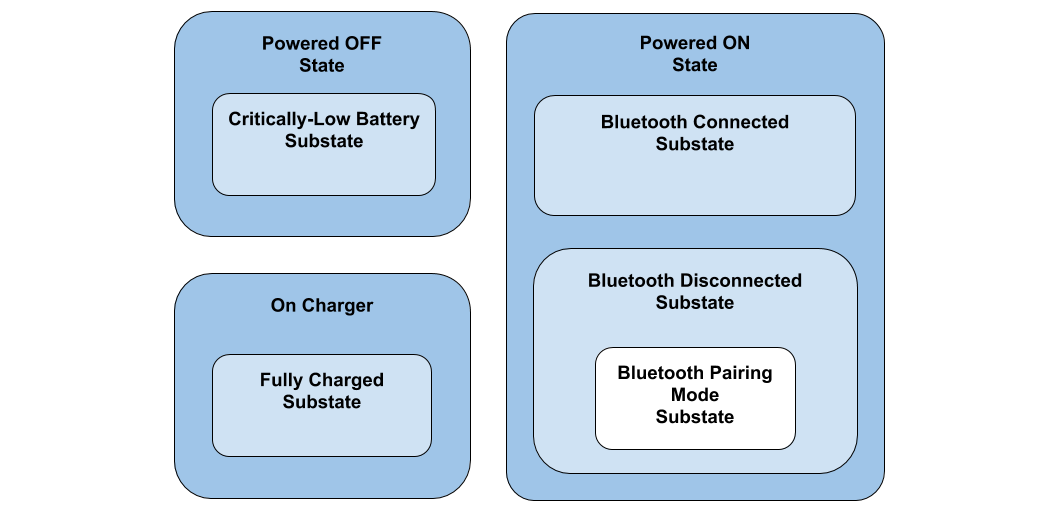HTHSM is a framework for implementing hierarchical finite state machines (HSMs) in C code. It allows you to keep event-driven code orderly and readable.
If you're building something that operates in a handful of clear cut modes/states, then it may be for you. An example of a project that would find benefit is a Bluetooth device with states like this:
#include "HTHSM.h"static HTHSM_Fsm stateMachine;HTHSM_STATE_DEF(debug_id, varName);
HTHSM_SUBSTATE_DEF(debug_id, varName, superstate);enum {
USER_EVENT_1 = HTHSM_SIG_USER_START,
USER_EVENT_2,
USER_EVENT_3,
};HTHSM_Dispatch() should be called from a single location, where events are handled from the event queue. Do not call HTHSM_Dispatch from within a state function.
HTHSM_Dispatch(&stateMachine, pEvent);For each state you define, you'll need to implement a handler function. The handler function name is its state's name suffixed by "_fxn".
// Event handler for "fsm_state_powerOff"
HTHSM_return_t fsm_state_powerOff_fxn (HTHSM_Fsm * me, HTHSM_Event const * pEvent){
// ...
}Use this function inside your event handler if a transition to a new state is necessary.
// Call HTHSM_Transition() to register a state transition to be performed AFTER the active state
// AND its superstates have completed dispatching the current event.
// Only call HTHSM_Transition() in the context of a HTHSM_State's event handler function.
// This operation will be ignored if called during an entry or exit event.
void HTHSM_Transition(HTHSM_Fsm *me, const HTHSM_State * const target);At the end of the event handler, return one of these values:
typedef enum
{
HTHSM_CONTINUE = 0, // Continue on to invoke the superstate's event handling
HTHSM_SUPPRESS_SUPERSTATES, // Bypass all superstates' event handling
HTHSM_SUPPRESS_IMMEDIATE_SUPERSTATE // Skip over the immediate superstate's event handling
} HTHSM_return_t;HTHSM_FsmCtor(&stateMachine, startingState, NULL);
HTHSM_FsmInit(&stateMachine);Optionally you can define a generic event handler function and specify it as the third parameter of the constructor. This function will be called anytime an event is dispatched to the state machine, making it useful for debugging.
Here's an example implementation for a Bluetooth device:
#include "HTHSM.h"
static HTHSM_Fsm stateMachine;
/*
Define and allocate memory for the the states using these macros:
HTHSM_STATE_DEF(id, name)
HTHSM_SUBSTATE_DEF(id, name, superstate)
The parameter 'id' is a numeric ID for debugging purposes
The parameter 'name' is how we reference the state later in the code below
The macro declares an event handler function that'll need to be implemented in the code below.
That function's name is its state's name suffixed with "_fxn"
*/
HTHSM_STATE_DEF(0, fsm_state_powerOff);
HTHSM_SUBSTATE_DEF(1, fsm_state_powerOff_criticallyLowBattery, fsm_state_powerOff);
HTHSM_STATE_DEF(2, fsm_state_powerOn);
HTHSM_SUBSTATE_DEF(3, fsm_state_powerOn_connected, fsm_state_powerOn);
HTHSM_SUBSTATE_DEF(4, fsm_state_powerOn_disconnected, fsm_state_powerOn);
HTHSM_SUBSTATE_DEF(5, fsm_state_powerOn_pairingMode, fsm_state_powerOn);
HTHSM_STATE_DEF(6, fsm_state_onCharger);
HTHSM_SUBSTATE_DEF(7, fsm_state_onCharger_fullyCharged, fsm_state_onCharger);
/*
Define the events that your states react to
*/
enum {
SIG_BUTTON_PUSH = HTHSM_SIG_USER_START,
SIG_BUTTON_REALEASE,
SIG_SHORT_BUTTON_PRESS,
SIG_LONG_BUTTON_PRESS_1,
SIG_LONG_BUTTON_PRESS_2,
SIG_CENTRAL_CONNECTED,
SIG_CENTRAL_DISCONNECTED,
SIG_CENTRAL_BONDED,
SIG_PLACED_ON_CHARGER,
SIG_REMOVED_FROM_CHARGER,
SIG_CHARGING_COMPLETED,
SIG_SECOND_TIMER_TICK,
SIG_GENERAL_PURPOSE_TIMER_FIRED,
SIG_PERIODIC_BATTERY_LEVEL_CHECK,
SIG_LOW_BATTERY,
SIG_BLUETOOTH_MESSAGE_RX,
};
// eventHandler is always executed in the "main" context
void eventHandler(HTHSM_Event * pEvent){
HTHSM_Dispatch(&stateMachine, pEvent);
}
/*
Implementations of each state's event handling function
*/
static HTHSM_return_t fsm_state_powerOff_fxn (HTHSM_Fsm * me, HTHSM_Event const * pEvent)
{
HTHSM_Event event;
switch (pEvent->sig)
{
case HTHSM_SIG_ENTRY:
// Disable the LED, sensors, etc
led_setColor(OFF);
// enter a low power state
enterDeepSleep();
// Poll to see if the device is on the charger
if(IS_ON_CHARGER()){
event.sig = SIG_PLACED_ON_CHARGER;
queue_enqueue(&event);
}
break;
case HTHSM_SIG_EXIT:
break;
case SIG_LONG_BUTTON_PRESS_1:
HTHSM_Transition(me, fsm_state_powerOn);
break;
case SIG_LONG_BUTTON_PRESS_2:
HTHSM_Transition(me, fsm_state_powerOn_pairingMode);
break;
case SIG_PLACED_ON_CHARGER:
HTHSM_Transition(me, fsm_state_onCharger);
break;
default:
break;
}
return HTHSM_CONTINUE;
}
static HTHSM_return_t fsm_state_powerOff_criticallyLowBattery_fxn (HTHSM_Fsm * me, HTHSM_Event const * pEvent)
{
// This is a substate of fsm_state_powerOff
switch (pEvent->sig)
{
case HTHSM_SIG_ENTRY:
break;
case HTHSM_SIG_EXIT:
stopTimer();
led_setColor(OFF);
break;
case SIG_LONG_BUTTON_PRESS_1:
led_setColor(RED);
startTimer(1000); // turn off the LED in 1000 milliseconds
// Bypass the PowerOff superstate's implementation
// Precenting the device from turning on
return HTHSM_SUPPRESS_SUPERSTATES;
case SIG_GENERAL_PURPOSE_TIMER_FIRED:
led_setColor(OFF);
break;
default:
break;
}
return HTHSM_CONTINUE;
}
static HTHSM_return_t fsm_state_powerOn_fxn (HTHSM_Fsm * me, HTHSM_Event const * pEvent)
{
HTHSM_Event event;
switch (pEvent->sig)
{
case HTHSM_SIG_ENTRY:
led_setColor(BLUE);
sensors_enable();
break;
case HTHSM_SIG_EXIT:
led_setColor(OFF);
sensors_disable();
break;
case SIG_LONG_BUTTON_PRESS_1:
HTHSM_Transition(me, fsm_state_powerOff);
break;
case SIG_PERIODIC_BATTERY_LEVEL_CHECK:
int batteryPercentage = battery_readCapacity();
if(batteryPercentage < 20){
event.sig = SIG_LOW_BATTERY;
queue_enqueue(&event);
}
break;
case SIG_LOW_BATTERY:
HTHSM_Transition(me, fsm_state_powerOff_criticallyLowBattery);
break;
default:
break;
}
return HTHSM_CONTINUE;
}
static HTHSM_return_t fsm_state_powerOn_disconnected_fxn (HTHSM_Fsm * me, HTHSM_Event const * pEvent)
{
switch (pEvent->sig)
{
case HTHSM_SIG_ENTRY:
bluetoothAdvertising_enable();
break;
case HTHSM_SIG_EXIT:
bluetoothAdvertising_disable();
break;
case SIG_CENTRAL_CONNECTED:
HTHSM_Transition(me, fsm_state_powerOn_connected);
default:
break;
}
return HTHSM_CONTINUE;
}
static HTHSM_return_t fsm_state_powerOn_connected_fxn (HTHSM_Fsm * me, HTHSM_Event const * pEvent)
{
switch (pEvent->sig)
{
case HTHSM_SIG_ENTRY:
break;
case HTHSM_SIG_EXIT:
break;
case SIG_CENTRAL_DISCONNECTED:
HTHSM_Transition(me, fsm_state_powerOn_disconnected);
case SIG_BLUETOOTH_MESSAGE_RX:
processBluetoothMessage(pEvent->param);
break;
default:
break;
}
return HTHSM_CONTINUE;
}
/*
Implement the other states' event handler functinos
...
*/
/*
Examples of interrupts that queue an event
to be processed by the state machine in the main context
*/
void button_interrupt(bool pressed){
HTHSM_Event event;
event.sig = pressed ? SIG_BUTTON_PUSH : SIG_BUTTON_RELEASE;
queue_enqueue(&event);
}
void timer_fired(){
HTHSM_Event event;
event.sig = SIG_GENERAL_PURPOSE_TIMER_FIRED;
queue_enqueue(&event);
}
int main(void){
/*
Construct and initialize the FSM
fsm_state_powerOff is the starting state
*/
HTHSM_FsmCtor(&stateMachine, fsm_state_powerOff, NULL);
HTHSM_FsmInit(&stateMachine);
// Main loop
for (;;)
{
// idle() stays in a low-power state until there's an event
idle();
while( !queue_empty() ){
HTHSM_Event event = queue_dequeue();
eventHandler(&event);
}
}
}
